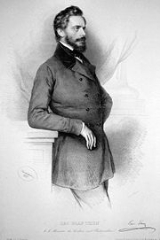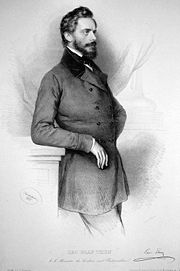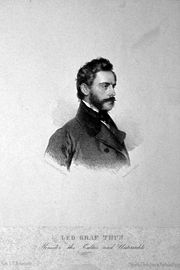
Leo von Thun-Hohenstein
Encyclopedia


Habsburg Monarchy
The Habsburg Monarchy covered the territories ruled by the junior Austrian branch of the House of Habsburg , and then by the successor House of Habsburg-Lorraine , between 1526 and 1867/1918. The Imperial capital was Vienna, except from 1583 to 1611, when it was moved to Prague...
n statesman from the Thun und Hohenstein family.
Early life
He was born in DěčínDecín
Děčín is a town in the Ústí nad Labem Region in the north of the Czech Republic. It is the largest town and administrative seat of the Děčín District.-Geography:...
(Tetschen) as the third son of Count Franz von Thun und Hohenstein. After studying law and philosophy at the University of Prague
Charles University in Prague
Charles University in Prague is the oldest and largest university in the Czech Republic. Founded in 1348, it was the first university in Central Europe and is also considered the earliest German university...
he traveled through Europe
Europe
Europe is, by convention, one of the world's seven continents. Comprising the westernmost peninsula of Eurasia, Europe is generally 'divided' from Asia to its east by the watershed divides of the Ural and Caucasus Mountains, the Ural River, the Caspian and Black Seas, and the waterways connecting...
, and among other countries he visited England
England
England is a country that is part of the United Kingdom. It shares land borders with Scotland to the north and Wales to the west; the Irish Sea is to the north west, the Celtic Sea to the south west, with the North Sea to the east and the English Channel to the south separating it from continental...
, where he became acquainted with James Hope-Scott
James Hope-Scott
James Robert Hope-Scott was a British barrister and Tractarian.-Early life and conversion:Born at Great Marlow, in the county of Buckinghamshire, and christened James Robert Hope, he was the third son of Sir Alexander Hope, and grandson of John Hope, 2nd Earl of Hopetoun...
and other leaders of the Tractarian party. He was much affected by the romantic movement and the Ultramontane revival.
In 1847 he married the Countess Clam-Martinic, but there was no issue of the marriage.
Bohemian nationalist
After his return home interested himself greatly in the revival of Czech languageCzech language
Czech is a West Slavic language with about 12 million native speakers; it is the majority language in the Czech Republic and spoken by Czechs worldwide. The language was known as Bohemian in English until the late 19th century...
and Czech literature
Czech literature
Czech literature is the literature written by Czechs or other inhabitants of the Czech state, mostly in the Czech language, although other languages like Old Church Slavonic, Latin or German have been also used, especially in the past. Modern authors from the Czech territory who wrote in other...
and the growth of Bohemian nationalism. He formed a personal friendship with František Palacký
František Palacký
František Palacký was a Czech historian and politician.-Biography:...
and other Czech leaders. He helped in the foundation of schools in which Czech should be taught, and set himself to acquire some knowledge of the language. He was also interested in prison
Prison
A prison is a place in which people are physically confined and, usually, deprived of a range of personal freedoms. Imprisonment or incarceration is a legal penalty that may be imposed by the state for the commission of a crime...
reform, on which he wrote, and other philanthropic work. After serving under Stadion
Stadion (state)
Stadion was a statelet of the Holy Roman Empire, located around Thannhausen in the present-day Bavarian administrative region of Swabia, Germany....
in Galicia, he was appointed in 1848, after the outbreak of the revolution, Regierungspräsident (president of the administration) and acting Statthalter (governor) in Bohemia.
He had scarcely entered on his duties when the rebellion of June broke out in Prague
Prague
Prague is the capital and largest city of the Czech Republic. Situated in the north-west of the country on the Vltava river, the city is home to about 1.3 million people, while its metropolitan area is estimated to have a population of over 2.3 million...
. In order to avoid bloodshed, he went down to the insurgents on the barricade, but was seized by them, imprisoned, and for some time his life was in danger. On his release he vigorously supported Windischgratz, who was in command of the troops, in the restoration of order, but thereby lost his popularity and was superseded. He still defended the Bohemian national movement, and in one of his writings laid down the principle that nationality
Nationality
Nationality is membership of a nation or sovereign state, usually determined by their citizenship, but sometimes by ethnicity or place of residence, or based on their sense of national identity....
was one of the interests outside the control of the state.
Minister of education and religion
In 1849 he accepted the office of minister of religion and education, which he held in 1860 under the autocratic and centralizing administration of Schwarzenberg and Baron Alexander von BachBaron Alexander von Bach
Baron Alexander von Bach was an Austrian politician...
. At first he threw himself with great energy into the task of building up an adequate system of schools. He summoned experienced teachers, Protestant as well as Catholic
Catholic
The word catholic comes from the Greek phrase , meaning "on the whole," "according to the whole" or "in general", and is a combination of the Greek words meaning "about" and meaning "whole"...
, from Germany, established middle and higher schools in all parts of the empire, superseded the antiquated textbooks and methods of instruction, and encouraged the formation of learned societies and the growth of a professional spirit and independence among the teachers. It is noticeable that at this time he insisted on the use of the German language
German language
German is a West Germanic language, related to and classified alongside English and Dutch. With an estimated 90 – 98 million native speakers, German is one of the world's major languages and is the most widely-spoken first language in the European Union....
in all schools of higher education. As minister of religion he was to a certain extent responsible for the concordat
Concordat
A concordat is an agreement between the Holy See of the Catholic Church and a sovereign state on religious matters. Legally, they are international treaties. They often includes both recognition and privileges for the Catholic Church in a particular country...
which again subjected the schools to the control of the Church: to a certain extent he thereby undid some of his work for the extension of education, and it was of him that Grillparzer said, "I have to announce a suicide
Suicide
Suicide is the act of intentionally causing one's own death. Suicide is often committed out of despair or attributed to some underlying mental disorder, such as depression, bipolar disorder, schizophrenia, alcoholism, or drug abuse...
. The minister of religion has murdered the minister of education." But during his administration the influence of the Church over the schools was really much less than, by the theory of the concordat, it would have appeared to be.
The crisis of 1860, when the office he held was abolished, was the end of his official career.
Federalist party
For the rest of his life he was a prominent leader of the Federalist party in Bohemia. His high social position, his influence at court, his character, as well as his undoubted abilities and learning, not often in Austria found in a man of his rank, gave him great influence. He supported the claims of Bohemia to a full autonomy; he strongly attacked both the February constitution and the AusgleichAusgleich
The Austro-Hungarian Compromise of 1867 established the dual monarchy of Austria-Hungary. The Compromise re-established the sovereignty of the Kingdom of Hungary, separate from and no longer subject to the Austrian Empire...
with Hungary; what he desired was a common parliament
Parliament
A parliament is a legislature, especially in those countries whose system of government is based on the Westminster system modeled after that of the United Kingdom. The name is derived from the French , the action of parler : a parlement is a discussion. The term came to mean a meeting at which...
for the whole empire based on a settlement with each one of the territories. With the old Czechs he refused to recognise the constitution of 1867; he helped to draft the declaration of 1868 and the fundamental articles of 1871, and took a leading part in the negotiations during the ministry of Potocki
Potocki
Potocki is the surname of a Polish noble family.-History:The Potocki family is a great artistocratic family originated from Potok in the Kraków Voivodeship; their family name derives from that place name. The family is heavily entwined with the cultural development and history of Poland's Eastern...
and Hohenwart
Hohenwart
Hohenwart is a municipality in the district of Pfaffenhofen in Bavaria in Germany....
. In order to found a strong Conservative party he established a paper, the Vaterland, which was the organ of the Clerical and Federalist party. He protested against the ecclesiastical legislation of 1867 and 1873.
He died in Vienna
Vienna
Vienna is the capital and largest city of the Republic of Austria and one of the nine states of Austria. Vienna is Austria's primary city, with a population of about 1.723 million , and is by far the largest city in Austria, as well as its cultural, economic, and political centre...
on 17 December 1888.

